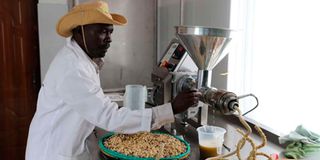Moringa farming is highly profitable yet widely unexplored in Kenya

Emuka Sacco chairman Theophillus Somba presses oil from moringa seeds on June 17, 2022. The sacco sells a litre of moringa oil for Sh8,000.
On a hot Friday afternoon in the sweltering heat at a small shop in Emali town in Makueni County off the Nairobi – Mombasa highway, Veronica Mwikali is neatly arranging plastic tins of various sizes on shelves. She is optimistic about the sales of her highly-sought after merchandise; moringa tree products.
Although the area’s harsh climate doesn’t smile upon farming endeavours, it suits the growth of moringa tree impeccably.

A worker pours dried moringa seeds and leaves into the machine that grinds the seeds into powder that is used to make various products such as body scrubs, seasoning and beverages.
The moringa tree is native to the foothills of the Himalayas in India and is mainly used as food and medicine. Often described as the most nutritious terrestrial plant in the world, the fast-growing, drought-resistant crop grows to about 12 metres high at maturity and has a lifespan of up to 20 years.
All parts of the moringa tree – including seeds, leaves, branches and bark – are processed into highly marketable products such as moringa oil, powder, face and body scrub, health supplements as well as animal feeds.
According to botanical experts, moringa is a super plant that is highly nutritious and laden with vitamins that boost digestion, skin health and immunity to its consumers.
“A lot of research has been done on moringa as compared to other plant species which is why we know so much about its superior nutritional properties,” said Sofia Mwakio, a nutritionist.
She added: “These key properties make it very lucrative on the market especially as people increasingly become more conscious about beauty and health.”
The shop Mwikali runs is owned by Emuka Moringa Farmers' Co-Operative Society, a sacco that is reaping bountiful profits courtesy of the growing popularity of moringa products. The sacco has 120 members and is aiming to attain a membership of at least 2,000.
Last year, the sacco invested in processing machines that injected a surplus of finished moringa products prompting the opening of this shop managed by Mwikali.

Mwikali’s shop was opened in 2021 as an outlet to sell the products processed by Emuka Sacco.
“Before the machine was bought, we used to grind the seeds and leaves manually to make powder and extract the oil which required a lot of workers and was time-consuming,” noted Mwikali.
Thanks to mechanisation, the process in less cumbersome now. After harvesting, the leaves are taken to the factory where they are cleaned, treated, dried and ground by the processor machine before they are packaged in tins of different sizes.
For the seeds, another machine squeezes the pricey oil out of the seeds from where it is collected, sorted and packaged ready for sale.
Demand for the products, especially moringa powder, has increased due to its famed nutritional and medicinal value. A 50 gram tin of the powder retails at Sh150.
“The powder is our leading product in the market. Consumers use it to season food and also add that earthy flavour to hot beverages such as tea and coffee. Many people want to have a healthy diet and moringa provides that added nutritional value to everyday food,” noted Mwikali.
Moringa oil is the plant’s premium product retailing for as much as Sh12,000 per litre perhaps due to its multi-purpose consumption; it can be used for cooking as well as for oiling the body.
Mwikali sells a litre of the oil at Sh8,000 per litre, but is often forced to resell in smaller qualities, the lowest being 205ml which goes for Sh2,000.
She also sells 1 kilogram of pellets, whch are basically husks that remain after extracting oil from seeds, at Sh100. These pellets are a delicacy for cattle, sheep, goats and chicken.
According to the chair of Emuka Sacco, Theophillus Somba, there is need to increase moringa tree farming in the area for greater yields at the factory which is presently producing a measly five litres of oil per day due to limited seed supply.
“Since we began pressing the oil, we have been able to help moringa tree farmers earn better incomes. However, we need more supply of the raw materials so we can increase our yields. If we produce more, we will begin exploring the export market and this will improve prices both for the processed products and also our farmer’s produce,” said Somba.





